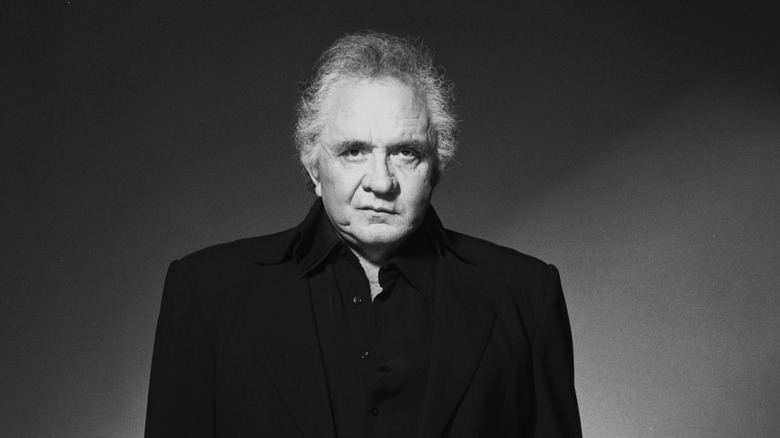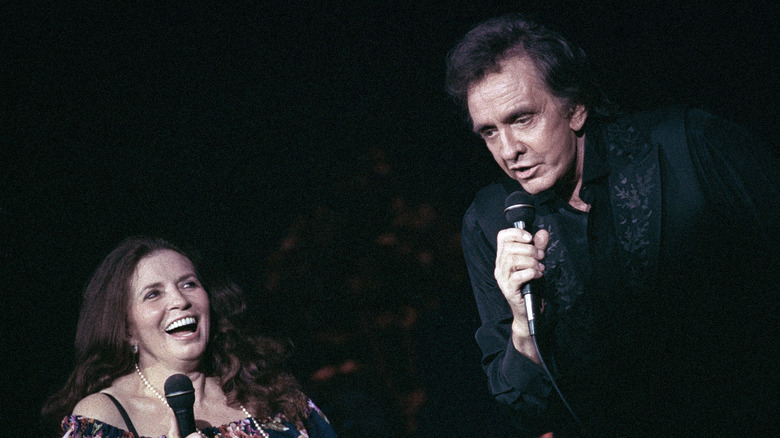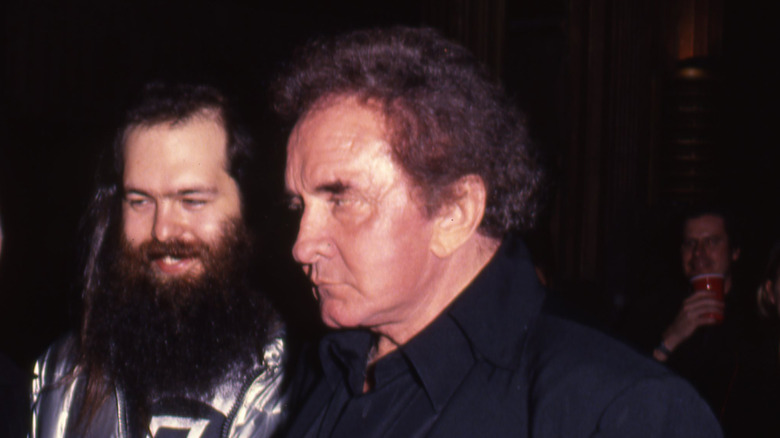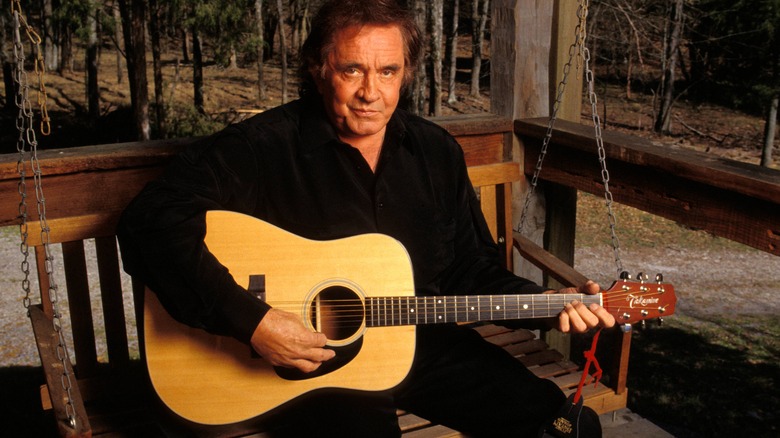Why Johnny Cash's Final Interview Was So Chilling
On August 20, 2003, MTV News' Kurt Loder sat down with the legendary country singer-songwriter Johnny Cash for an interview following Cash's series of nominations for MTV's Video Music Awards that year. Cash, looking weary — his handsome face drawn, his once-strong voice gravelly — had experienced a rough couple of years both physically and emotionally. He'd lost the love of his life, June Carter Cash, that May, and had a litany of medical issues starting in the late 1990s. Most notably, diabetes and autonomic neuropathy, which is nerve damage that can affect blood pressure, digestion, and other bodily functions.
Toward the end of the wide-ranging interview, Loder asked Cash about his faith in the face of mortality. "Oh, I expect my life to end pretty soon; you know," Cash said (via "Johnny Cash: The Last Interview: and Other Conversations"). "I'm 71 years old. And I, um, have great faith, though. I have unshakeable faith; I've never been angry with God. I've never turned my back on God, so to speak. I never thought God wasn't there. I knew that He is my counselor; He is my wisdom. All the good things in my life come from Him." On September 12, 2003, 23 days after what would turn out to be Cash's final interview, he died from complications from diabetes.
Love and faith
Johnny Cash was born into a family of sharecroppers in Kingsland, Arkansas, on February 26, 1932. In Cash's youth, he lost his older brother Jack in a saw-mill accident, which haunted him his entire life. After serving in the U.S. Air Force and holding down a series of dead-end jobs, Cash's musical career took off in 1955 thanks to Sun Records, the seminal Memphis record label that also launched the careers of Elvis Presley and Roy Orbison.
Cash met June Carter, who came from country music royalty as the daughter of Maybelle Carter, a member of the pioneering Carter Family. Both Cash and Carter were married when they met in the late 1950s at the Grand Ole Opry and began touring together. They married in 1968. According to Town & Country, Carter helped Cash address his addiction issues and renew his Christian faith. Throughout the 1960s and 1970s, Cash was a country superstar with his own TV show and a string of hit records. During the MTV interview, Cash said that while he appreciated "all the praise and the glory," it didn't change anything. "I just do what I do, and just hope people enjoy it, and just try to be myself in whatever I do," he said (via "Johnny Cash: The Last Interview: and Other Conversations").
Go to work
In 1993, Johnny Cash began working with the record producer Rick Rubin, best known as the cofounder of the groundbreaking Def Jam Records, which helped popularize hip-hop. They worked together for the final decade of Cash's life releasing a series of albums known collectively as "American Recordings." The stripped-down sound introduced Cash to a whole new generation of fans.
In the final days of June Carter Cash's life, as she lay dying, she pushed her husband to keep on making music. "She told me in the hospital, said, 'Go to work,'" Cash told Kurt Loder during his final interview for MTV News (via YouTube). "I said, 'What're you talking about?' And she said 'Don't worry about me, go to work.' ... Three days after the funeral ... I was in the studio. ... And I stayed in the studio for two weeks. And it was great therapy for me. And I think I accomplished more in that couple of weeks than most of the other year combined." Rubin believed that music was the only thing keeping Cash alive following his wife's death. "Once June passed, he had the will to live long enough to record, but that was pretty much all," Rubin recalled (via Biography). "A day after June passed, he said, 'I need to have something to do every day. Otherwise, there's no reason for me to be here.'"
Where do we go?
Even while Johnny Cash focused on recording, the loss of his wife was a devastating blow. The country musician Marty Stuart, Cash's former son-in-law, recalled sitting with Cash after June's death. Cash broke down and began crying. "Man, I miss her so bad," Stuart recalled Cash telling him as he held his hand (via "The Man Comes Around: The Spiritual Journey of Johnny Cash"). "What I saw at that moment is that he would have traded every bit of fame, fortune — everything that Johnny Cash meant to the world — for five minutes with June," Stuart added.
The week before Johnny Cash died, he finished the final track for his fifth album with Rick Rubin, "American V: A Hundred Highways," which was released after his death. Kurt Loder, in his final question to Cash during the MTV interview, continued on with his theme of mortality. "Where do you think we go afterward?" he asked Cash (via YouTube). "Where do we go when we die, you mean?" Cash responded. "Yes," Loder answered. "Well, we all hope to go to heaven," Cash said, nodding his head.



